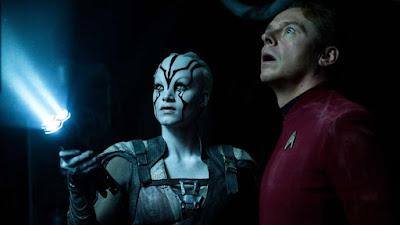 |
| Image courtesy of Lionsgate. |
There's some decent material to be mined from this scenario, even if the movie doesn't entirely work and has a familiar issue that plagues films of this type in that it tries a little too hard to capture the way people actually speak and act when filming themselves via cell phones and social media. There are, however, a few scenes that are very tense, especially if you're the type of person who does not enjoy the sensation of vertigo.
As the film opens, risk averse teen Vee (Emma Roberts) is coming up with ways to delay telling her mother (Juliette Lewis) that she intends to go away for college when she gets sucked in by her troublemaker pal Sydney (Emily Meade) to play Nerve. At first, Vee agrees to play the game to show her friends that she's not as much of a chicken as they think she is, but eventually stays with it after enjoying her 15 minutes of fame among the thousands who apparently tune in. Also, it helps that the game's winners get money deposited into their bank accounts every time they complete a dare.
So, yes, the logistics of the game may force you to extend your disbelief and the film doesn't do a particularly convincing job of setting up that the group of friends who dominate the film - a school photographer, her dorky male friend, a cheerleader, etc. - would actually be in the same clique, but it has its moments once it gets going.
There are two particularly unnerving scenes involving characters engaging in absurdly stupid behavior at extreme heights that nearly made me want to crawl out of my skin, although some of the other dares - a high speed motorcycle ride involving a blindfold, for instance - veer more toward the silly.
"Nerve" manages to capture the zeitgeist fairly well - from its iPhone and app obsessed characters to the courage gained by certain people when they are able to hide behind an online avatar - even if its final lecture is a bit obvious and a plot hatched by the characters to defeat the game is far fetched, to put it mildly.
Then again, while the film provides a fairly apt portrayal of where our tech obsessed society appears to be heading, the whole thing is pretty far fetched. There are some elements to admire, but "Nerve" might ultimately end up getting on yours.









